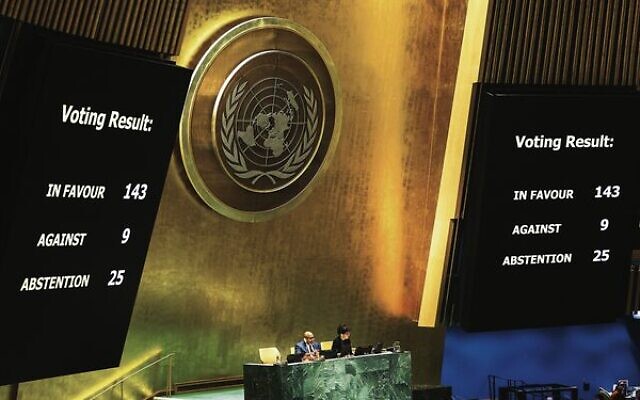Working towards a just and enduring peace
These are difficult conversations, and I am deeply concerned about the division in our community. We must work to heal and come together.

I know that for the Jewish community this is an extremely difficult time.
There are few words that can capture the horror of October 7. More Jewish lives lost than on any day since the Holocaust. Hundreds of hostages taken. Israel – the Jewish state established in the aftermath of the Holocaust – under attack.
Around the world, including sadly here in Australia, antisemitism has been on the rise. Jewish Australians have been shamefully targeted over events in the Middle East for which they are not responsible. I understand you when you say you feel under siege. I say again: you have a right to feel safe. Antisemitism has no place anywhere, including our university campuses. I stand against it. We all must stand against it.
I know that there is concern about how Australia voted at the UN General Assembly on Saturday. I want to explain the reasons for Australia’s vote so you know where we’re coming from, though you may disagree.
This is about what Australia can do to encourage the conditions for lasting and just peace.
For decades, the Middle East has known conflict interspersed with peace that is only ever fragile at best. Israel faces the existential threat of Iran, as well as Hezbollah, Hamas and other terrorist groups. It faces the insecurity of not being fully recognised in its region.
Israel’s long-term security depends on a two-state solution – a Palestinian state alongside the State of Israel.
Australia and many other countries have been frustrated by the lack of progress towards this goal. The international community wants to build momentum. That’s fundamentally what the UN vote was about.
First, let me say that this isn’t the way we would have done things or the resolution we would have proposed, but we have to deal with the vote in front of us. Second, I would note that the final resolution was substantially different from how it began.
So, let’s be clear about what the resolution actually does.
It maintains the status of the Palestinian delegation as an observer at the UN, with modest additional rights to participate in UN forums. And it expresses the aspiration for eventual Palestinian UN membership, which first must be endorsed by the Security Council.
Importantly, it reaffirmed “unwavering support for the two-state solution of Israel and Palestine, living side by side in peace and security within recognised borders”.
This is a rejection of the goals and methods of Hamas. A two-state solution is the opposite of what Hamas wants – and it is firmly in the interests of Israelis who deserve long-term security.
In a recent article, Ami Ayalon, former head of Shin Bet and commander of Israel’s navy, argued that “even if Israel prevails on the battlefield, Hamas’s ideology will not disappear.” And that “a two-state solution would not be a defeat for Israel but a victory – and would be the only way to truly weaken Hamas.”
This vote does not change our perspective on the current crisis. Hamas must release all hostages. We continue to urge a humanitarian ceasefire as a matter of urgency. The catastrophic humanitarian situation must be addressed. I continue to press for these outcomes in my engagements with countries with influence in the region.
The question of bilateral recognition by Australia is separate. I have made clear that we will be guided by whether recognition will advance the cause of peace. Like Germany and the UK – staunch friends of Israel – Australia no longer sees recognition as only occurring at the end of negotiations. It could occur as part of a peace process, and once there is progress on governance reforms and security concerns.
We see no role for Hamas. Hamas is a terrorist organisation. A Palestinian state cannot be in a position to threaten Israel’s security.
We want to see a reformed Palestinian governing authority that is committed to peace, that disavows violence and is ready to engage in a meaningful political process. We want to see a commitment to peace in how the Palestinian Authority leads its people.
The final status of core issues such as Jerusalem and the borders of a future Palestinian state should be defined through direct negotiations.
These are difficult conversations, and I am deeply concerned about the division in our community. We must work to heal and come together.
We know that this one vote won’t end a conflict that has spanned our entire lifetimes. A political process is required – and a political horizon is needed for Palestinians that support a two-state solution. What this vote tells you is that the international community wants to work together to create the conditions to for such a process; to overcome decades of intractable conflict, for the just and enduring peace Israelis and Palestinians deserve. As confronting as these diplomatic efforts are, we know the alternative is much worse.
Penny Wong is Australia’s Foreign Minister.

comments